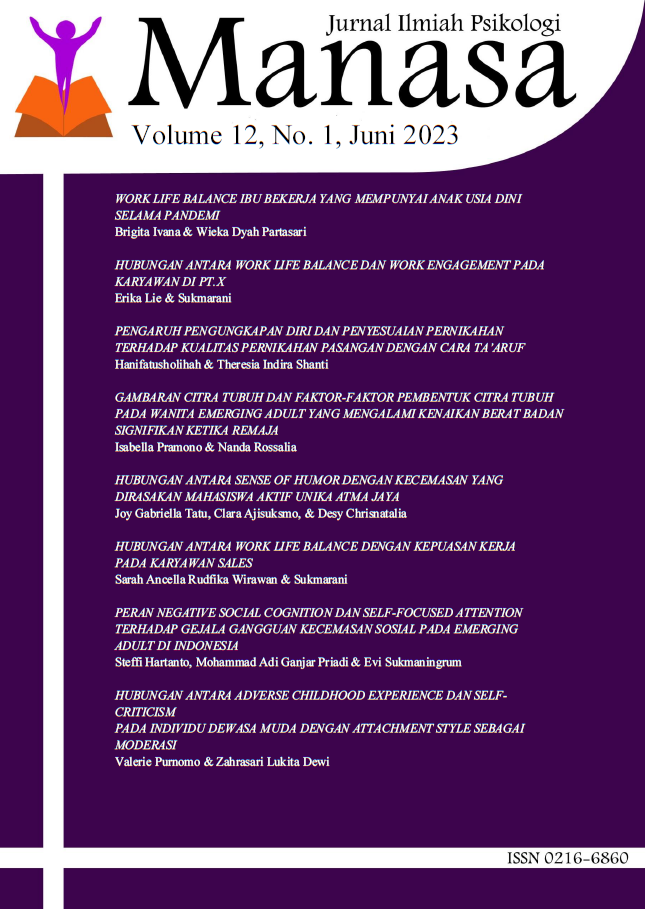HUBUNGAN ANTARA ADVERSE CHILDHOOD EXPERIENCE DAN SELF-CRITICISM PADA INDIVIDU DEWASA MUDA DENGAN ATTACHMENT STYLE SEBAGAI MODERASI
DOI:
https://doi.org/10.25170/manasa.v12i1.4493Keywords:
Adverse Childhood Experiences, self-criticism, moderate, attachment stylesAbstract
Self-evaluation evolves because of all the experiences they have; experiences can alter selfevaluation. Indonesian children may encounter developmental disruption in the form of Adverse Childhood Experiences (ACE), leading to increased self-criticism and negative self-assessment. On the other hand, there are various protective characteristics against adverse childhood experiences, one of which is attachment styles, which urge researchers to perform study on the association between ACE and self-criticism mediated by attachment styles in early adult individuals. The ACE Questionnaire, Levels of Self-Criticism, and Relationship Style Questionnaire were used to assess ACE, self-criticism, and attachment styles, which were then moderately analyzed using PROCESS. 223 participants' data (ranging from 19 to 40 years old) were gathered via digital forms. The results of the moderation calculation revealed that ACE was considerably positively connected to the level of self-criticism. Attachment styles—negative with Secure and positive with Preoccupied, Fearful, and Dismissing—have a major impact on one's level of self-criticism. Individuals who experience ACE and have an attachment style of Dismissing
are more prone to experience strong Internalized Self-Criticism. Including ACE characteristics such as socioeconomic position, bullying, or peer rejection in the calculation might broaden the picture of ACE and highlight their distinct impact on self-criticism levels.
References
Agnew, C. R., & South, S. C. (2014). Interpersonal relationships and health: Social and clinical psychological mechanisms. New York: Oxford University Press.
Anda, R., & Felitti, V. (2008). The relationship of adverse childhood experiences to adult health, wellbeing, social function, and healthcare. Retrieved from http://citeseerx.ist.psu.edu/viewdoc/download?doi=10.1.1.545.278&rep=rep1&type=pdf
Arifin, I. A., Soetikno, N., & Dewi, F. I. R. (2021). Kritik diri sebagai mediator pada hubungan konsep diri dan perilaaku Nonsuicidal Self-Injury remaja korban perundungan. Jurnal Muara Ilmu Sosial, Humaniora, dan Seni, 5(2), 317-326. doi: https://doi.org/10.24912/jmishumsen.v5i2.9973
Baetens, I., Claes, L., Onghena, P., Grietens, H., Leeuwen, K. V., Pieters, C., . . . Griffith, J. W. (2014). Non-suicidal self-injury in adolescence: A longitudinal study of the relationship between NSSI, psychological distress and perceived parenting. Journal of Adolescence, 37(6), 817-826. doi:https://doi.org/10.1016/j.adolescence.2014.05.010
Bartholomew, K., & Horowitz, L. (1991). Attachment styles among young adults: a test of a four category model. Journal of Personality and Social Psychology, 61, 226-244.
Bethell, C., Jones, J., Gombojab, N., Linkenbach, J., & Sege, R. (2019). Positive childhood experiences and adult mental and relational health in a statewide sample: Associations across adverse childhood experiences levels. JAMA Pediatrics. doi:doi: 10.1001/jamapediatrics.2019.3007
Blanch, A., Shern, D., & Steverman, S. (2014). Toxic stress, behavioral health, and the next major era in public health. Mental Health America.
Blatt, S. J., & Luyten, P. (2009). A structural-development psychodynamic approach to psychopathology: Two polarities of experience across the life span. Development and Psychopathology, 21, 793-814. doi:10.1017/S0954579409000431
Bowlby, J. (1979). The making and breaking of affectional bonds. London: Tavistock.
Briere, J. N., & Scott, C. (2015). Principles of Trauma Therapy: A guide to symptoms, evaluation, and treatment. California: Sage Publication Inc.
Campos, R., Besser, A., & Blatt, S. (2010). The mediating role of self-criticism and dependency in the association between perceptions of maternal caring and depressive symptoms. Depression and Anxiety, 1149-1157.
Cantazaro, A., & Wei, M. (2010). Adult attachment, dependence, self-criticism, and depressive symptoms: A test of a mediational model. Journal of Personality, 78(4), 1135-1162. doi:10.1111/j.1467-6494.2010.00645.x
Center for Disease Control and Prevention. (2016). About the CDC-Kaiser ACE study: Study questionnaires. Retrieved from Retrieved from www.cdc.gov/violenceprevention/acestudy/about.html
Chen, Y., Kubzansky, L. D., & VanderWeele, T. J. (2019). Parental warmth and flourishing in mid-life. Social Science and Medicine, 65-72.
Chui, W.-Y., & Leung, M.-T. (2016). Adult attachment internal working model of self and other in Chinese culture: Measured by the Attachment Style Questionnaire — Short Form (ASQ-SF) by confirmatory factor analysis (CFA) and item response theory (IRT). Personality and Individual Differences, 96, 55-64. doi:http://dx.doi.org/10.1016/j.paid.2016.02.068
Chung, E. K., Mathew, L., Elo, I. T., Coyne, J. C., & Culhane, J. F. (2008). Depressing symptoms in disadvantaged women receiving prenatal care: The influence of adverse and positive childhood experiences. Ambulatory Pediatrics, 109-116.
Clervil, R., & DeCandia, C. J. (2013). Integrating and sustaining trauma-informed care across diverse service system. Washington D.C.: American Institute for Research.
Cohen, R. J., & Swerdlik, M. E. (2010). Psychological testing and assessment: An introduction to tests and measurement (7th ed.). McGraw-Hill Education.
Cronholm, P. F., Forke, C. M., Wade, R., Megan, H. B.-M., Davis, M., Harkin-Schwarz, M., . . . Fein, J. A. (2015). Adverse Childhood Experiences: Expanding the concept of adversity. American Journal of Preventive Medicine, 354-361. doi:http://dx.doi.org/10.1016/j.amepre.2015.02.001
Dunkley, D. M., Denise, M., Lee, I. A., Preacher, K. J., & Zuroff, D. C. (2014). Advancing complex explanatory conceptualizations of daily negative and positive affect: Trigger and maintenance coping action patterns. Journal of Counseling Psychology, 61(1), 93-109. doi:10.1037/a0034673
Finkel, E. J. (2019). Complementing the sculpting metaphor: Reflections on how relationship partners elicit the best or the worst in each other. Review of General Psychology, 127–132.
Finklehor, D., Shattuck, A., Turner, H., & Hamby, S. (2013). Improving the Adverse Childhood Experiences Study Scale. JAMA Pediatr, 167(1), 70-75. doi:doi:10.1001/jamapediatrics.2013.420
Gilbert, P., & Irons, C. (2009). Shame, self-criticism, and self-compassion in adolescence. In N. B. Allen, & L. B. Sheeber, Adolescent Emotional Development and the Emergence of Depressive Disorders (pp. 195-214). London: Cambridge University Press.
Gilbert, P., & Procter, S. (2006). Compassionate Mind Training for people with high shame and self-criticism: Overview and pilot study of a Group Therapy Approach. Clinical Psychology and Psychotherapy, 353-379. doi:10.1002/cpp.507
Gilbert, P., Clarke, M., Hempel, S., & Irons, C. (2004). Criticizing and reassuring oneself: An exploration of forms, styles, and reasons in female students. British Journal of Clinical Psychology, 31-50.
Gillath, O., Karantzas, G. C., & Fraley, R. C. (2016). Adult Attachment: A Concise Introduction to Theory and Research. London: Elsevier.
Glassman, L. H., Weierich, M. R., Hooley, J. M., Deliberto, T. L., & Nock, M. K. (2007). Child maltreatment, non-suicidal self-injury, and the mediating role of self-criticism. Behaviour Research and Therapy, 2483-2490.
Griffin, D. W., & Bartholomew, K. (1994). Model of the Self and Other: Fundamental Dimensions Underlying Measures of Adult Attachment. Journal of Personality and Social Psychology, 67(3), 430-445. doi:doi:10.1037/0022-3514.67.3.430
Hayes, A. F. (2018). Introduction to Mediation, Moderation, and Conditional Process Analysis. New York: The Guilford Press.
Hayes, A. F. (2022, March 14). Download : The PROCESS macro for SPSS, SAS, and R. Retrieved from The PROCESS macro for SPSS, SAS, and R: https://www.processmacro.org/index.html
Hidhayanthy, T. (2019). Gambaran Attachment Style pada Perempuan yang Fatherless. Fakultas Psikologi Universitas Sumatera Utara: Medan.
Hill, M. D. (2020). Adaptive Information Processing Theory: Origins, Principles, Applications, and Evidence. Journal of Evidence-Based Social Work, 317-331. doi:https://doi.org/10.1080/26408066.2020.1748155
Hudges, K., Bellis, M. A., Hardcastle, K. A., Sethi, D., Butchart, A., Mikton, C., . . . Dunne, M. P. (2017). The effect of multiple adverse childhood experiences on health: a systematic review and meta-analysis. The Lancet Public Health, 356-366. doi:doi:10.1016/s2468-2667(17)30118-4
Infurna, F., Rivers, C., Reich, J., & Zautra, A. (2015). Childhood trauma and personal mastery: Their influence on emotional reactivity to everyday events in a community sample of middle-aged adults. PLOSOne. Retrieved from https://journals.plos.org/plosone/article?id=10.1371/journal.pone.0121840
Iniguez, K., & Stankowski, R. (2016). Adverse childhood experiences and health in adulthood in a rural population-based sample. Clinical Medicine & Research, 14(3-4), 126-137.
Irons, C., & Heriot-Maitland, C. (2020). Compassion Mind Training: An 8-week group for the general public. Psychology and Psychotherapy: Theory, Research, and Practice, 94(3), 443-463. doi:10.1111/papt.12320
Jakubiak, B. K., & Tomlinson, J. M. (2020). The Role of Social Support in Promoting Self-Development. In B. A. Mattingly, K. P. McIntyre, & G. W. Lewandowski, Interpersonal Relationships and the Self-Concept (pp. 125-143). Cham: Springer Nature Switzerland.
Kalmakis, K. A., & Chandler, G. E. (2014). Health consequences of adverse childhood experience. Journal of the American Association of Nurse Practitioners, 1-9.
Kalmakis, K. A., & Chandler, G. E. (2015). Health consequences of adverse childhood experiences: A systematic review. Journal of the American Association of Nurse Practitioners, 457-465. doi:doi: 10.1002/2327-6924.12215
Lassri, D., & Shahar, G. (2012). Self-criticism mediates the link between childhood emotional maltreatment and young adults' romantic relationships. Journal of Social and Clinical Psychology, 289-311.
Ledrich, J., & Gana, K. (2012). Relationships between self-discrepancies, dispositional dimensions, and depressive and anxious moods. In K. Gana, Psychology of Self-Concept (pp. 74-90). New York: Nova Science Publishers, Inc.
Leeman, J. (2018). Living our parents’ trauma: Effects of child abuse and neglect on the next generation. Australian Catholic University. Retrieved from http://researchbank.acu.edu.au/cgi/viewcontent.cgi?article=1664&context=theses
Löw , C. A., Schauenburg, H., & Dinger, U. (2020). Self-criticism and psychotherapy outcome: A systematic review and meta-analysis. Clinical Psychology Review, 75. doi:10.1016/j.cpr.2019.101808
Matos, M., Duarte, C., Duarte, J., Pinto-Gouveia, J., Petrocchi, N., Basran, J., & Gilbert, P. (2017). Psychological and physiological effects of Compassionate Mind Training: A pilot randomised controlled study. Mindfulness, 1-14. doi:10.1007/s12671-017-0745-7
Mattingly, B. A., McIntyre, K. P., & Lewandowski Jr, G. W. (2020). Relationship-induced self-concept change: Theoretical perspectives and methodological approaches. In B. A. Mattingly, K. P. McIntyre, & G. W. Lewandowski Jr, Interpersonal relationships and the self-concept (pp. 1-20). Cham: Springer Nature.
McEwan, K., & Gilbert, P. (2016). A pilot feasibility study exploring the practising of compassionate imagery exercises in a nonclinical population. Psychology & Psychotherapy, 239-243. doi:10.1111/papt.12078
Merrick, M. T., Ports, K. A., Ford, D. C., Afifi, T. O., Gershoff, E. T., & Grogan-Kaylor, A. (2017). Unpacking the impact of adverse childhood experiences on adult mental health. Child Abuse and Neglect, 10-19. doi:https://doi.org/10.1016/j.chiabu.2017.03.016
Mikulincer, M., & Shaver, P. R. (2007). Attachment in adulthood: Structure, dynamics, and change. New York: The Guildford Press.
Mirman, A., Bick, A. S., Kalla, C., Canetti, L., Segman, R., Dan, R., . . . Bonne, O. (2021). The imprint of childhood adversity on emotional processing in high functioning young adults. Human Brain Mapping, 615-625. doi:https://doi.org/10.1002/hbm.25246
Nurius, P. S., Green, S., Logan-Greene, P., & Borja, S. (2015). Life course pathways of adverse childhood experiences toward adult psychological well-being: A stress process analysis. Child Abuse & Neglect, 45, 143-153.
Poletti, S., Colombo, C., & Benedetti, F. (2014). Adverse childhood experiences worsen cognitive distortion during adult. Comprehensive Psychiatry, 1803-1808. doi:http://dx.doi.org/10.1016/j.comppsych.2014.07.013
Ramadani, D., Wahyuni, E., & Hidayat, D, R. (2020). Gambaran kritik diri (self-criticism) pada mahasiswa. Jurnal Konseling dan Pendidikan 10(1), 185-192. doi: https://doi.org/10.29210/176700
Salloum, A., Johnco, C., Smyth, K. M., Murphy, T. K., & Storch, E. A. (2017). Co-Occuring Posttraumatic Stress Disorder and Depression Among Young Children. Child Psychiatry and Human Development, 49(11).
Santrock, J. W. (2011). Life-span development. New York: McGraw-Hill.
Schofield, T. J., Lee, R. D., & Merrick, M. T. (2013). Safe, stable, nuturing relationships as moderator of intergenerational continuity of child maltreatment: A meta-analysis. Journal of Adolescent Health, 32-38. doi: http://dx.doi.org/10.1016/j.jadohealth.2013.05.004
Sege, R. D., & Browne, C. H. (2017). Responding to ACEs With HOPE: Health Outcomes From Positive Experiences. Academic Pediatrics, S79-S85.
Shahar, G. (2006). An Investigation of the Perfectionism/Self-criticism Domain of the Personal Style Inventory. Cognitive Therapy and Research, 30, 185-200.
Shahar, G. (2015). Erosion: The psychopathology of self-criticism. New York: Oxford University Press.
Shahar, G. (2016). Criticism in the Self, Brain, Relationships, and Social Structure: Implications for Psychodynamic Psychiatry. Psychodynamic Psychiatry, 395-422.
Soleimanpour, S., Geierstanger, S., & Brindis, C. D. (2017). Adverse Childhood Experiences and Resilience: Addressing the Unique Needs of Adolescents. Academic Pediatrics, 108-117.
Thimm, J. C. (2010). Personality and early maladaptive schemas: A five-factor model perspective. Journal of Behavior Theraphy and Exp Psychiatry, 373-380. doi:doi:10.1016/j.jbtep.2010.03.009
Thimm, J. C. (2013). Early maladaptive schemas and interpersonal problem: A circumplex analysis of the YSQ-SF. Journal of Behavior Therapy and Exp Psychiatry, 113-124.
Wade Jr, R., Cronholm, P. F., Fein, J. A., Forke, C. M., Davis, M. B., Harkins-Schwarz, M., . . . Bair--Merritt , M. H. (2016). Household and community-level Adverse Childhood Experiences and adult health outcomes in a diverse urban population. Child Abuse & Neglect, 135-145. doi:http://dx.doi.org/10.1016/j.chiabu.2015.11.021
Waite, R., & Ryan, R. A. (2020). Adverse Childhood Experiences: What students and health professionals need to know. New York: Routledge.
Wakelin, K. E., Perman, G., & Simonds, L. M. (2021). Effectiveness of self-compassion-related interventions for reducing self-criticism: A systematic review and meta-analysis. Clinical Psychology & Psychotherapy, 1-25. doi:10.1002/cpp.2586
Downloads
Published
Issue
Section
License
Copyright (c) 2023 MANASA

This work is licensed under a Creative Commons Attribution-NonCommercial-ShareAlike 4.0 International License.









.png)
.png)

